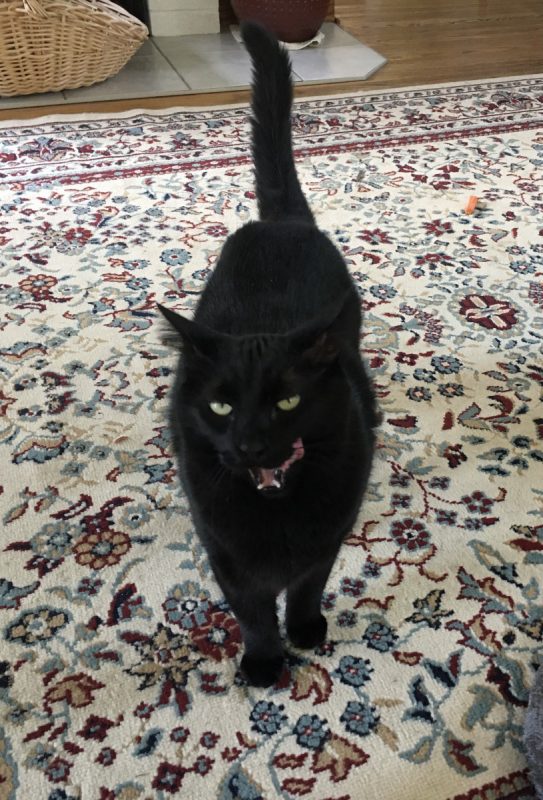Paw Prints: Furry Friends Help My Sister Do Life With PD
Written by |

My sister Bev, who has stage 3 Parkinson’s disease (PD), has always been an animal lover. I asked her to share with me how her pets have helped her through her illnesses.
“I’ve had dogs and cats all of my life and always considered them great and loving friends, not pets,” Bev said. “I believe that God gave them a sense of knowing when you are sick, sad, happy, anxious, and in need.”
She said she never realized how much her pets have helped her until she was older and confronting health issues. Then she recognized the extent to which her pets have supported her both physically and emotionally.
“When I was in my later years and my children were living on their own, my pets were my companions and were always with me,” Bev explained. “I never really felt alone because I could tell them my feelings, needs, and dislikes, and they seemed to respond in their own way.”
“I believe that pets have a sixth sense, so to speak,” she added. “I remember before my heart surgery, my dog Willie seemed to sense before I did that something was wrong with me. … He followed me around, continually watching over me, and sometimes, he’d just stare at me when I was sitting in the living room chair.”
When Bev came home after two months of rehab from heart surgery, Willie hadn’t forgotten her, but this time, he was sick.
“I knew he no longer had a quality of life,” Bev said. “I decided to let him go. I mourned him like the loss of a child.”
Bev’s daughter-in-law volunteered at an animal shelter and almost immediately brought her another dog, Abbey, who would leave her paw prints on Bev’s heart and everyone else’s. Abbey was 14 months old at the time.

One of Bev’s beloved pets, Abbey. (Photo by Jo Gambosi)
“Abbey and I were inseparable,” Bev said. “I had nurse visits after my colon cancer surgery, and Abbey would follow the nurses into my room and lie on my bed, watching them change my dressings and check on me. She accompanied the nurses to the front door to leave and then came back by my side.”
Abbey was the sweet, caring friend by Bev’s side night and day.
“When I was diagnosed with PD in 2017, my dear friend Abbey was getting older along with me,” she said. “She developed diabetes and arthritis. However, she remained faithful and seemed to know when my balance was off and when I was having a difficult day. Abbey never walked in front of me. It was like she knew that I might trip over her.”
Both the Parkinson’s Foundation and the Michael J. Fox Foundation note that for many people with Parkinson’s disease, pets can provide both companionship and practical help with daily life.

Bev’s cat, Malachi. (Photo by Jo Gambosi)
Service dogs can be used to help people with PD, too. Dogs can help their owners maintain balance while walking or alert a family member after a fall. They can even be trained to push an emergency alert button to summon help.
Additionally, Parkinson’s News Today columnist Mary Beth Skylis noted that, “Dogs also can help with freezing episodes by nudging or encouraging their owner to move forward.”
Although Abbey was not a trained service dog and was small in stature, she would stay by Bev’s side after my sister fell. (Falling is common in PD due to balance and weakness issues, as well as aging.) Abbey was an ongoing source of love, companionship, and encouragement.
Sadly, in the past six months, Abbey has crossed the Rainbow Bridge, and Bev still misses her. Bev told me one day, ”I thought I would die first, not Abbey. I miss her so much, even though I do love Izzy, my new dog.”

Bev’s new dog, Izzy. (Photo by Jo Gambosi)
Cats also can help people with PD by decreasing loneliness, increasing exercise (try catching them!), and increasing a sense of purpose. Bev’s cat, Malachi, loves to rub against Bev’s legs and “begs” to sit on her lap for some good fur rubs. Bev feeds Malachi and her newest pup, Izzy, every morning and evening. It is a task she never seems to forget.
“My friends throughout the years were each irreplaceable in their own way,” she said, referring to her pets. “I always felt like they were one of my children. How you treat them, they will treat you — with kindness, love, and trust. Don’t miss out on one of God’s greatest gifts to us.”
***
Note: Parkinson’s News Today is strictly a news and information website about the disease. It does not provide medical advice, diagnosis or treatment. This content is not intended to be a substitute for professional medical advice, diagnosis, or treatment. Always seek the advice of your physician or another qualified health provider with any questions you may have regarding a medical condition. Never disregard professional medical advice or delay in seeking it because of something you have read on this website. The opinions expressed in this column are not those of Parkinson’s News Today or its parent company, Bionews, and are intended to spark discussion about issues pertaining to Parkinson’s disease.




Patricia Miller
Enjoyed the article on the benefits of pet
Ownership. Too often advanced adults
Are discouraged from having a pet
because it might be too difficult. Having to
Be responsible for a furry friend is motivating
And stimulating a good thing to keep going.
Thing.
Jamie dunn
That was an awesome article I also have Parkinson's I have a beautiful golden retriever who is me constant companion
LouAnn Redaelli
Thank you Jo. This article brought tears to my eyes as I know how much
pets play a role in promoting and managing health and mindfulness.